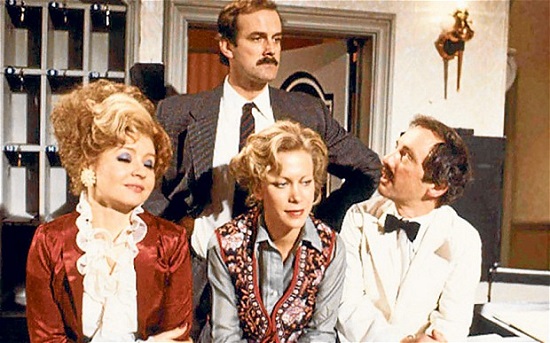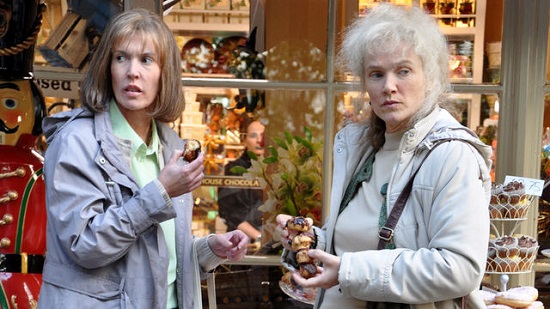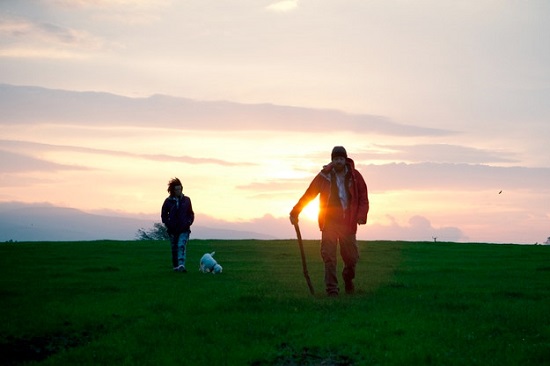Ben Wheatley’s Sightseers, available now on DVD, is many things: a funny, shocking road movie-cum-serial killer thriller; an example, alongside the likes of Mike Leigh’s Nuts In May (1976) of what Sight & Sound magazine’s Ben Walters terms ‘British bathetic bucolic’ (a "semi-absurdist mode in which sublime natural landscapes form the backdrop for neurotic urban odd couples getting things wrong"); and a further exciting development in the burgeoning career of one of Britain’s most bracingly original directors (following the earthy black comedy of 2009’s Down Terrace and the fierce psychodrama of 2011’s Kill List).
It’s also something of a culmination; firstly, it represents the satisfying end product of years of work from co-writers and stars Alice Lowe and Steve Oram, who dreamed up the film’s core characters (psychotic Brummie caravaners Tina and Chris) seven years ago after meeting at regular comedy night Ealing Live, and have since developed them onstage and online. Secondly – and perhaps more importantly – Sightseers is the cinematic zenith of a particular strain in English (primarily televisual) comedy to have mercilessly explored what we might deem the less palatable aspects of the so-called English national character.
In his book The English National Character Peter Mandler describes the idea of a national character as that of "a people forming in a given nation [that] have some psychological or cultural characteristics in common that bind them together and separate them from other peoples". Though any such manifestation of that definition is by its very nature amorphous and debatable – not to mention susceptible to lapse into cliché – it is nevertheless fair to suggest that over time a number of particular characteristics have crystallised into a general idea of how the world sees us English, and how we perceive ourselves. On the plus side, we’ve got stiff-lipped stoicism, wit, perseverance, pride and a healthy self-deprecation. Yet Napoleon Bonaparte’s famously ambiguous rejoinder that we are "a nation of shopkeepers" acts as a handy gateway into the negatives, to wit: pettiness, repression (sexual and otherwise), emotional inarticulacy, perpetuation of class division, a grim fondness for schadenfreude, and a perversely magnetic attraction to failure.
The ghosts of black comedy past
Needless to say, it is very much these negative characteristics that have been seized upon in Wheatley’s film. As Chris and Tina’s grim story develops, and they travel from the Midlands to the northwest of England leaving a trail of wanton destruction in their wake, it’s as though they are simultaneously embarking on an evocative, whistlestop tour of the historical traits of dark comedy of, and about, the English national character.
In 34-year-old Tina’s desperately unhealthy, weirdly interdependent relationship with her manipulative mother Carol (Eileen Davies), there are distinct echoes of Galton and Simpson’s seamy, pathos-riddled Steptoe And Son (BBC, 1962-1974), which pitted a needy, sybaritic father (a "dirty old man", beautifully played by Wilfred Brambell) against his despairing, trapped son (Harry H. Corbett). In his portrayal of thwarted would-be novelist Chris, Oram channels the spirit of peak-era Leonard Rossiter, the late actor who embodied two of the key symbols of 1970s English failure; Rigsby, the miserly, shabby landlord in Rising Damp (ITV, 1974-1978), and downtrodden suburban fantasist Reggie Perrin (The Fall And Rise Of Reginald Perrin, BBC 1976-1979). Furthermore, with his hair-trigger temper, and apoplectic self-righteousness, Chris is also deeply redolent of John Cleese’s iconically English, repressed hotel manager Basil Fawlty (Fawlty Towers, BBC, 1975-79).

Sightseers also chimes clearly with more recent English black comic televisual fare. Ricky Gervais’ lacerating study of failure, pettiness and aborted ambition, The Office (BBC, 2001-2003, and since afforded a not-unappealing American makeover) is a clear influence on the anti-social conduct and broken suburban dreams of Tina and Chris. Meanwhile, the long-running Peep Show (C4, 2003-), which zeroes in on male self-loathing and sociopathy, seems particularly pertinent to Chris. The spineless manner in which he dispenses with Tina’s company at the mere sniff of making a new friend (a nicely-judged turn from Richard Glover) is pure Peep Show. When Chris ruminates absurdly "the noble English oak – that won’t stab you in the back or belittle your five-year plan. That tree won’t involve itself in low-level bullying that means you have to leave work", it could just as easily be the show’s terminally bitter ex-credit manager Mark Corrigan (David Mitchell) talking. Finally, in his airy declaration, "I just want to be feared and respected", Chris mines the tone of venomous anomie (venomie?) which pervades Armando Iannucci’s state-of-the-nation The Thick of It (BBC, 2005-13) – a show which, despite its ostensibly political focus, sheds more light on the venal day-to-day social workplace interactions of us Brits than many of us would care to admit.
In Sightseers‘ wending narrative and host of oddball minor characters, you may even recognise hints of the picaresque-grotesque of Matt Lucas and David Walliams’ pseudo sketch-show Little Britain (BBC, 2003-06), whose success hinged on the viewer’s understanding of national archetypes; the genuinely warped carnivalesque of The League of Gentlemen (BBC, 1999-2002); or Julia Davis’ vicious character study Nighty Night (BBC, 2004-5). All, in their varying ways, examined a small-minded, parochial English weirdness, the type of which is certainly apparent in Wheatley’s film. You may also pick up on the unctuous cheesiness of Alan Partridge in I’m Alan Partridge (BBC, 1997-2002), a doomed-to-fail character whose breakdown also involved a catastrophic road trip (all the way to Dundee in his bare feet!). Looming above everything is the shadow of Chris Morris (Jam, Brass Eye), widely considered to be the modern capofamiglia of scalpel-sharp black comedy reflecting English mores and peccadilloes.
Looking at this list of antecedents, it comes as no surprise to discover that the filmed iteration of Sightseers began as a TV pilot directed by Paul King (The Mighty Boosh), but was summarily rejected by the networks for being too dark. Only Julia Davis and Jessica Hynes’ thematically germane Lizzie And Sarah (BBC, 2010) can match Sightseers for sheer nastiness. An astonishingly grim black comedy about two downtrodden suburban housewives, it featured such delights as a husband violently shagging his wife while holding a pillow over her face (only for her to emerge with a meek, post-ejaculation "thank you"); and another errant spouse giving the obese maid a good, unapologetic seeing-to in full view of his own wife and daughter. Perhaps unsurprisingly, it too never made it past the pilot stage (though that may also have been because almost all of its characters had been viciously murdered in a Sightseers-esque spree by the end).

Smallness goes big
The types of behaviour exhibited by the panoply of English malcontents listed above thrives in TV sitcom form because negative characteristics are allowed, nay encouraged, to settle into a locked, unresolvable groove. They are played for laughs, simultaneously discomfiting and comforting to the viewer, who come to expect such things on a week-by-week basis. What distinguishes Sightseers as cinematic is not merely Wheatley’s pedigree and the grand guignol violence (allowed freer rein in cinemas than on TV), but also the unusual and disturbing cognitive dissonance between the grotesque smallness of the characters and the beautiful country landscapes (shot with widescreen aplomb by cinematographer Laurie Rose). In this respect, it echoes Michael Winterbottom’s The Trip (BBC, 2011), an uncharacteristically plot-free six-part sitcom in the ‘British bathetic bucolic’ vein, which was concertinaed into a 90-minute feature for the benefit of American audiences, perhaps in order to spare them from the oceanic depths of passive-aggressiveness inherent in the lightly subverted personae of principal actors Steve Coogan and Rob Brydon (familiar to British TV viewers, not so much elsewhere).
Accordingly, it will be fascinating to see how American audiences respond to the determinedly English Sightseers (it has been picked up for theatrical release by US distribution company IFC Films). Many critics have been keen to compare Wheatley’s film to the likes of Arthur Penn’s Bonnie And Clyde (1967), Terrence Malick’s Badlands (1973), and Oliver Stone’s Natural Born Killers (1994), seeing as they all feature murderous couples on the run across wide-ranging landscapes. And though Sightseers undoubtedly cleaves to this American generic template in some respects, it’s notably bereft of the glamour, poetry and, well, American Dream-ness that defines such works. It is to be hoped that US audiences pick up on the affectionate, and yes, self-deprecating irony inherent in Wheatley’s film. As Oram told Sight & Sound‘s Walters: "It’s an American idea, but done in an English way, i.e. shit. Tarantino does it and it’s really cool – and then we come along and we’re wearing cagoules and we’re being Brummies".

And perhaps the unlikely runaway Broadway success (in 2011) of Jez Butterworth’s Jerusalem (named after the song form of William Blake’s short poem – ‘And did those feet in ancient time’) – a three-hour, Somerset-set play centred on a likeable, but potentially paedophile rural fabulist – suggests that cultured US audiences may indeed have the stomach for such indigenous weirdness. Such sympathetic viewers will surely recognise and appreciate Wheatley’s ingeniously ironic appropriation of Blake’s poem (voiced in this case by the unmistakably English John Hurt) to score a particularly gruesome, though oddly beautiful, murder midway through Sightseers.
England under the scalpel
What American audiences may miss, however, is just how of the bleak national moment Wheatley’s film is. Critics have pointed to Chris’ post-murder put-down of an unpleasant fellow hiker ("he’s not a person, he’s a Daily Mail reader!") as a smugly liberal point-and-laugh apologia for cathartic violence. But such a reading is surely predicated on Chris exhibiting some kind of political consciousness. Instead, he’s little more than a small-minded pseudo-libertarian who indulges in an unconvincing spot of class warfare ("Did you go to a private school? I thought so. It’s the entitlement") as a convenient conduit for his bloodlust. Though both Chris and Tina are well-drawn, multilayered characters, neither exhibit anything like a consistent value system (the best Chris can manage is to criticise Tina for murdering a cyclist in the incorrect manner) and are motivated entirely by selfish reasons, reflecting our atomised society and the gradual dismantling of communities. So what, then, is Sightseers, if not a deliciously acidic riposte to Prime Minister David Cameron’s laughable ‘Big Society’; a construct as glib as it is meaningless? You want ‘Broken Britain’, dear viewer? Here it is. We’re fucked as a country, says Sightseers: alone together, together alone.
Furthermore, one can’t dismiss the inherent significance of the year of Sightseers‘ release date. If works of art can be judged as products of their time, it makes Sightseers the child of spiralling recession and coalition-authored austerity, the continued (irreversible?) breakdown of relations between the press and public, and the opening of a giant closet packed to the gills with skeletons of prolific light-entertainment paedophiles. Sure, we had the joyous veneer of Danny Boyle-inspired Olympian success to cheer, but that was transient, and even so undercut – in oh so English fashion – by Stephen Daldry’s shambolic, haplessly derivative and backward-looking closing night ceremony.
Ultimately then, Sightseers is, for better, for funnier, for sadder and for scarier, a thoroughly English piece of work. Rooted in a recognisable reality and unmistakably plugged into a lineage of great English comedy, it’s both a comment on, and an exploration of, what it means to embrace the dark side of being English, both historically and contemporaneously. Simultaneously nasty, awkward and thrilling, Wheatley’s unique film thoroughly deserves to be canonised as an indigenous classic.
Sightseers is available on DVD now via StudioCanal UK


